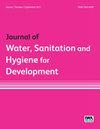Promoting safe and inclusive water and sanitation services for students with physical disabilities in primary schools: a concept mapping study in Ghana
IF 1.4
4区 环境科学与生态学
Q3 WATER RESOURCES
Journal of Water Sanitation and Hygiene for Development
Pub Date : 2023-05-23
DOI:10.2166/washdev.2023.029
引用次数: 1
Abstract
Improving water, sanitation, and hygiene (WASH) services in schools is crucial to providing inclusive environments for all children to thrive in school. Particularly for children with disabilities, the school environment can serve as a barrier to their access and use of WASH facilities. This study examines strategies and programmes needed to promote safe and inclusive WASH services for primary schools in Ghana. We recruited 22 stakeholders from the Upper West Region of Ghana to complete an online concept mapping exercise. Participants generated eight themes they felt were important for promoting safe and inclusive access to WASH for students with physical disabilities (PWDs). These themes included ‘building special schools,’ ‘guidance services,’ ‘ensuring non-discrimination and fair treatment,’ ‘additional programs for PWDs,’ ‘local government interventions,’ ‘public sensitization,’ ‘teacher training,’ and ‘supervision.’ Statements that do not demand large resources or financial needs are frequently easier to execute than those that do. The GO-zone was utilized to identify easy-to-implement and important strategies as the first step in addressing WASH issues for PWDs. These findings can assist stakeholders in identifying strategies and activities they should prioritize in the short run to improve WASH among students with PWDs.促进为小学身体残疾学生提供安全和包容的水和卫生服务:加纳的一项概念地图研究
改善学校的水、环境卫生和个人卫生服务对于为所有儿童在学校茁壮成长提供包容性环境至关重要。特别是对残疾儿童来说,学校环境可能成为他们进入和使用讲卫生设施的障碍。本研究考察了为促进加纳小学提供安全和包容的讲卫生服务所需的战略和规划。我们从加纳上西部地区招募了22名利益相关者来完成一项在线概念地图绘制工作。与会者提出了他们认为对促进身体残疾学生安全、包容地获得讲卫生知识很重要的八个主题。这些主题包括“建立特殊学校”、“指导服务”、“确保不歧视和公平待遇”、“残疾人士额外项目”、“地方政府干预”、“公众敏感”、“教师培训”和“监督”。不需要大量资源或财务需求的报表通常比需要大量资源或财务需求的报表更容易执行。go区域被用来确定易于实施和重要的战略,作为解决残疾人讲卫生问题的第一步。这些发现可以帮助利益相关者确定他们应该在短期内优先考虑的战略和活动,以改善残疾学生的讲卫生活动。
本文章由计算机程序翻译,如有差异,请以英文原文为准。
求助全文
约1分钟内获得全文
求助全文
来源期刊

Journal of Water Sanitation and Hygiene for Development
WATER RESOURCES-
CiteScore
3.10
自引率
11.80%
发文量
58
审稿时长
16 weeks
期刊介绍:
The Journal of Water, Sanitation and Hygiene for Development is a peer-reviewed journal devoted to the dissemination of high-quality information on the science, policy and practice of drinking-water supply, sanitation and hygiene at local, national and international levels.
 求助内容:
求助内容: 应助结果提醒方式:
应助结果提醒方式:


